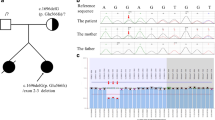Abstract
Bartter syndrome with sensorineural deafness (Bartter syndrome type 4) is an autosomal recessive disorder characterized with polyhydramniosis, premature birth, massive polyuria, renal salt-wasting, hypokalemic metabolic alkalosis, normotensive hyperreninemic hyperaldosteronism, and hearing loss. Homozygous mutations in BSND, CLCNKA, and CLCNKB mutations cause the disorder. Here we report a 3-year-old boy who had not been evaluated and investigated before cochlear implantation. Hypokalemia was detected during the routine laboratory workup before surgery. Further analyses revealed metabolic alkalosis with high renin and aldosterone levels. Hypokalemia improved with oral potassium chloride supplementation. Genetic tests revealed a homozygous c.139G>A (pG47R) mutation in BSND gene, and both parents were heterozygous for the same mutation. We want to emphasize the importance of evaluating hearing loss in children, since some of the genetic syndromes may cause life threatening abnormalities.
Similar content being viewed by others
Avoid common mistakes on your manuscript.
Case presentation
A 3-year-old male patient was admitted to the otolaryngology department for cochlear implantation plan with the diagnosis of bilateral sensorineural deafness. During the preoperative evaluation, severe hypokalemia (serum potassium, 2.4 mmol/L) was observed and referred to the pediatric nephrology department. There was not any history of diarrhea, vomiting, or polyuria. He was born at 33 weeks of gestational age with a history of polyhydramniosis from healthy non-consanguineous parents. His birth weight was 2.100 g. He was the third child with healthy two siblings.
On admission, the patient’s weight was 10 kg and length was 86 cm, all of which were below the 3rd percentile for the age. He did not have facial dysmorphism. He was normotensive.
In biochemical investigation, serum creatinine was 0.46 mg/dL and urea was 16 mg/dL. Serum electrolytes showed hyponatremia (serum sodium, 130 mmol/L), severe hypokalemia (serum potassium, 2.4 mmol/L), and hypochloremia (serum chloride, 87 mmol/L). Serum calcium was 9.5 mg/dL, serum phosphate was 5.1 mg/dL, and serum magnesium was 2.4 mg/dL, all of which were in normal ranges. The patient had metabolic alkalosis (blood gas pH, 7.55; HCO3, 28.4 mmol/L) together with high plasma renin activity (983 pg/mL; reference range, 3.18 to 32.61 pg/mL) and elevated aldosterone level (2891 pg/mL; reference range, 12 to 340 pg/mL). Ultrasonographic evaluation did not reveal any pathologies such as nephrocalcinosis. Oral sodium supplements and potassium chloride treatment were administered. Subsequently, the electrolyte levels became normal (sodium and potassium levels after supplementation were 140 mmol/L and 3.7 mmol/L, respectively). The patient underwent surgery for cochlear implantation.
Questions
-
1.
What is the diagnosis?
-
2.
Which genetic defects cause the disease?
-
3.
What is the treatment and prognosis of the disease?
Author information
Authors and Affiliations
Corresponding author
Additional information
The answers to these questions can be found at https://doi.org/10.1007/s00467-019-04383-8.
Rights and permissions
About this article
Cite this article
Aksoy, O.Y., Cayci, F.S., Ceylaner, S. et al. Hypokalemia and hearing loss in a 3-year-old boy: Questions. Pediatr Nephrol 35, 615 (2020). https://doi.org/10.1007/s00467-019-04379-4
Received:
Revised:
Accepted:
Published:
Issue Date:
DOI: https://doi.org/10.1007/s00467-019-04379-4




